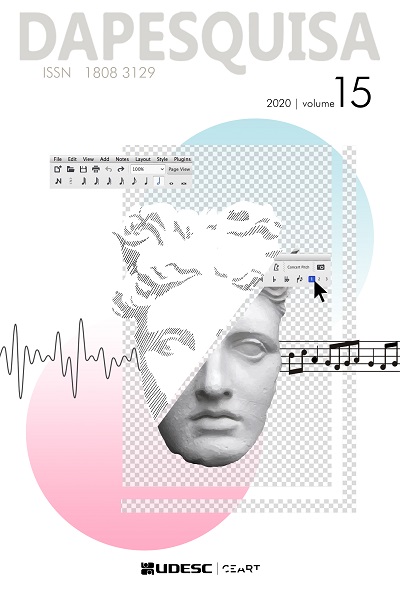Estratégias de design para o desenvolvimento de produtos de moda na perspectiva da sustentabilidade
DOI:
https://doi.org/10.5965/1808312915252020e0033Palavras-chave:
Moda, Ambientalismo, Desenvolvimento sustentável, Designers de modaResumo
Diante de um cenário de insustentabilidade ambiental onde a indústria da moda encontra-se inserida, devido a produção e consumo excessivo de recursos naturais aliado ao modelo de desenvolvimento econômico, o presente artigo objetiva investigar e sintetizar estratégias presentes na literatura relacionada ao design para a sustentabilidade para promover o enfrentamento deste cenário, bem como direcionar a prática do profissional designer de moda. A metodologia utilizada neste estudo foi orientada pelo método de revisão bibliográfica integrativa associado à representação gráfica de síntese, onde foi construída uma mandala com a intenção de representar a síntese das estratégias propostas. O estudo mostrou como, de fato, o designer de moda exerce grande influência na mudança para o novo paradigma sustentável, ao compreender com profundidade todo o sistema de moda, bem como ao reconhecer a complexidade e dificuldades que demandam novas estratégias para o desenvolvimento de produtos com vistas a novos estilos de vida que respeitem o ciclo de vida, previstos nas dimensões que regem o desenvolvimento sustentável.
Downloads
Referências
BUENO, J.; PADOVANI, S. Estudo do processo de aprendizagem colaborativa através das representações gráficas de síntese (RGSs). In: CONGRESSO INTERNACIONAL DE DESIGN DA INFORMAÇÃO, 7., 2015, Brasília. Anais eletrônicos [...]. Brasília : Blucher Design Proceedings, v. 2, n. 2, p. 374-385, set. 2015. DOI: 10.5151/designpro-CIDI2015-cidi_178. Disponível em: https://www.proceedings.blucher.com.br/article-list/cidi2015-255/list#articles. Acesso em: 03 mar. 2020.
DAHER, C. E.; SILVA, E. P. de La S.; FONSECA, A. P. Logística Reversa: Oportunidade para Redução de Custos através do Gerenciamento da Cadeia Integrada de Valor. Brazilian Business Review , Vitória, v. 3, n. 1 , p. 58-73, jan./jun. 2006. Disponível em: https://repositorio.unb.br/bitstream/10482/12550/1/ARTIGO_LogisticaReversaOportunidade.pdf. Acesso em: 21fev. 2020.
FLETCHER, K.; GROSE, L.(org.) Moda & Sustentabilidade: design para mudança. São Paulo: SENAC, 2011.
MANZINI, E.; VEZZOLI, C. O desenvolvimento de produtos sustentáveis: os requisitos ambientais dos produtos industriais. São Paulo: Universidade de São Paulo, 2011.
PAIXÃO, W. et al. Criatividade e aprendizagem colaborativa através da produção de representações gráficas de síntese: uma experiência com alunos de artes visuais. In: CONGRESSO INTERNACIONAL DE AMBIENTES HIPERMÍDIA PARA APRENDIZAGEM, 16., 2017, Florianópolis. Anais eletrônicos [...]. Florianópolis : Blucher Design Proceedings, v. 3, n. 11, p. 483-495, jun. 2017. DOI: 10.5151/16ergodesign-0049. Disponível em: https://www.proceedings.blucher.com.br/article-list/cinahpa2017-289/list#articles. Acesso em: 18 out. 2018.
PAPANEK, V. Design for the real world: human ecology and social change. 2nd ed. Academy Chicago Publishers: Illinois, 2009.
SACHS, I. Caminhos para o desenvolvimento sustentável. Rio de Janeiro: Garamond, 2002.
SALCEDO, E. Moda ética para um futuro sustentável. Barcelona: Editora Gustavo Gili, 2014.
SAMPAIO, C. P. de et al. Design para a sustentabilidade: dimensão ambiental. Curitiba: Insight, 2018.
SANTOS, A. Níveis de maturidade do design sustentável na dimensão ambiental. In: MORAES, D. de; KRUCKEN, L. (org.) Cadernos de estudos avançados em design. Barbacena : EdUEMG, 2009. (Sustentabilidade;1). p.13-26. Disponível em: http://eduemg.uemg.br/images/livros-pdf/catalogo-2009/2009_CADERNOS_DE_ESTUDOS_AVANCADOS_EM_DESIGN_SUSTENTABILIDADE_I_VOL_3.pdf. Acesso em: 31 mar. 2020
SOUZA, M. T; SILVA, M. D. da; CARVALHO, R. de. Revisão integrativa: o que é e como fazer. Einstein, São Paulo, v. 8, n. , p. 102-106, jan./mar. 2010. DOI: http://dx.doi.org/10.1590/s1679-45082010rw1134. Disponível em: https://www.scielo.br/pdf/eins/v8n1/pt_1679-4508-eins-8-1-0102.pdf. Acesso em: 17 abr. 2020.
VEZZOLI, C. et al. Sistema produto + serviço sustentável: fundamentos. Curitiba: Insight, 2018. E-book. Disponível em: http://editorainsight.com.br/wp-content/uploads/2018/03/aSistema-ProdutoServico-Sustentavel_web.pdf. Acesso em: 05 ago.2019.
Publicado
Como Citar
Edição
Seção
Licença
Copyright (c) 2020 Andréia Mesacasa, Patrícia Sorgatto

Este trabalho está licenciado sob uma licença Creative Commons Attribution 4.0 International License.
Autores que publicam nesta revista concordam com os seguintes termos:
Autores mantém os direitos autorais e concedem à revista o direito de primeira publicação, com o trabalho simultaneamente licenciado sob a Licença Creative Commons Atribuição 4.0 Internacional, a qual permite que outros distribuam, remixem, adaptem e criem a partir do seu trabalho, mesmo para fins comerciais, desde que lhe atribuam o devido crédito pela criação original, reconhecendo a autoria e publicação inicial nesta revista.
A DAPesquisa, segue as recomendações do movimento de Acesso Aberto, proporciona acesso público a todo seu conteúdo, a partir do princípio de que tornar gratuito o acesso a pesquisas gera um maior intercâmbio global de conhecimento.
Plágio, em todas as suas formas, constitui um comportamento antiético de publicação e é inaceitável. A revista DAPesquisa utiliza o software iThenticate de controle de similaridade.





